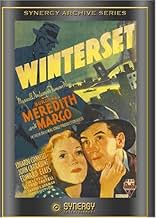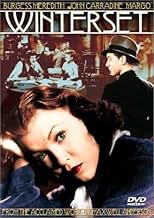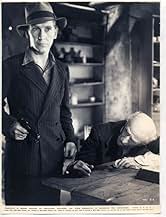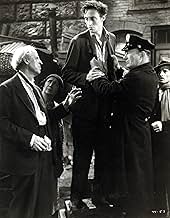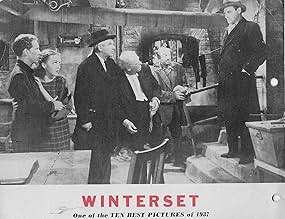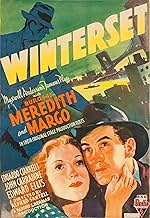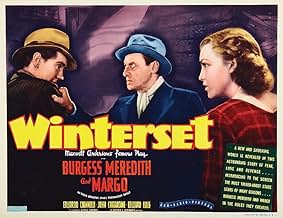Añade un argumento en tu idiomaImmigrant radical Bartolomeo Romagna is falsely condemned and executed for a payroll robbery. Years later, his son Mio sets out to find the truth of the crime and to bring to account the gan... Leer todoImmigrant radical Bartolomeo Romagna is falsely condemned and executed for a payroll robbery. Years later, his son Mio sets out to find the truth of the crime and to bring to account the gangster Trock Estrella.Immigrant radical Bartolomeo Romagna is falsely condemned and executed for a payroll robbery. Years later, his son Mio sets out to find the truth of the crime and to bring to account the gangster Trock Estrella.
- Dirección
- Guión
- Reparto principal
- Nominado para 2 premios Óscar
- 4 premios y 4 nominaciones en total
Murray Alper
- Louie
- (sin acreditar)
Reseñas destacadas
Maxwell Anderson's Pulitzer Prize winning Broadway play was brought to the screen by RKO in 1936 with the original cast members, and Anderson himself adapting the Screen-Play.........The results were a hard-hitting expose' of injustice in the Judicial system of the 1920s........Based loosely on the Sacco-Vancetti trial of the 1920s, Anderson wrote a powerful adaptation of his Stage hit...........Burgess Meredith, along with Eduardo Ciannelli reprised their Stage roles as Mio, and Troc Estrella respectively in their first screen appearences......Both would go on to do scores of films and stage work for decades to come after Critic's raved about their work in "Winterset"......Set under the Brooklyn Bridge for most of the film, the characters involved in the injustice, assemble seeking the truth & to avoid it becoming public knowledge.........Ciannelli's "Troc Estrella" is one of the screens most dastardly bad guys of all time......and Stanley Ridges is a standout as "Shadow' his henchman...............The Musical score by Nathaniel Shilkret & Max Steiner(un-credited) was nominated for an Oscar.......It was so compelling in this Dark-Drama, that Orson Welles used portions of it in his film "Journey Into Fear'-1942....also released by RKO.......If you are a fan of fine Dramatic Acting, superb musical scoring, and very early film noir(1936)....you should see "Winterset.......Tense, Poetic, and spell-binding....It is available on Video and DVD at Amazon.com, for a very low price.......Respectively submitted, sasheegm at the movies
I thought Burgess Meredith turned in quite a characterful performance in this otherwise rather dry drama. He is "Mio" whose late father we have already seen at the top of the film being condemned to the chair for his part in a robbery. Now, a generation later he is determined to prove that he was innocent. What quickly becomes apparent is that the investigation at the time was largely based around the "if your face fits" theory, and it doesn't take "Mio" very long to get onto the trail of a far more likely culprit. Meantime, we also discover that a speech made by his dad upon sentencing declaring his innocence and warning the judge that his will be a sort of living death from now on has turned out to be eerily true. That judge (Edward Ellis) has indeed somewhat lost the plot, and is a ghost of his former self wandering the streets with little memory of who he is or was. It might well be that "Mio" could be in a position to salvage more than one should here? The plot clearly seeks to highlight the difficulties for the poverty stricken, slum-dwelling, population of the USA to not just get by in life, but to get a fair hearing from authority. That's not just the court proceedings, but also far more rudimentary aspects of freedom. Even an assembly to dance attracts the police. Ultimately, though, it really does come down to a straightforward style of good and evil, and with the underplayed but effectively sinister effort from Eduardo Ciannelli and a really quite impactful one from Ellis, this can at times be quite a poignant evaluation. Alfred Santelli hasn't done so much to creatively adapt it from the stage though, and that straight transfer to celluloid sees it lose quite a bit of it's intensity. Even with the romantic attachment to "Miriamne" (Margo), much of the intimacy is gone, the dialogue is all too often delivered as if it were set-piece monologues, and none of the characters really come together until very near the end. Just taking it from the theatre to the cinema was always going to compromise some of the nuance, and though this is still a decent effort it just misses a little of the story's soul.
Despite having read the liner notes, I thought from the publicity artwork that WINTERSET would be something Gothic. It is Gothic, in its bleakness, but is squarely centered in the Depression era of the United States. It was completely of it's time, and considering that the film was adapted from the Broadway play, it must have been daring, with sub themes of socialism and police corruption. (The play was by Maxwell Anderson, who wrote KEY LARGO and THE BAD SEED.) Perhaps that contributed to the film receiving two Academy Award nominations.
This is the story of Mio (Bartholomio a young, dewy Burgess Merideth) trying to clear his father's name. In the first scenes, his namesake Father, played with riveting stillness by the painfully thin John Carradine, was accused of murder he did not commit, given no defense, and put to death. Years later, his son goes to the slums of New York to try to find out the truth.
I had to remind myself that this was made in 1936, so it is still very early in the talkies. The sets are a wonderful blend of realism and expressionism (similar to the famous stage sets of Arthur Miller's A VIEW FROM THE BRIDGE), giving this a Gothic noir flavor. Rain is often used as a "purifier" in stage and film, but here it is effectively used to create an oppressive humidity, a torrent of sludge. It is clear that film noir, Orson Wells, and THE THIRD MAN's Director Carol Reed all owe a debt to early films like this. The set elements are all here in tight proximity, the stone, the shadowed doorways, the waterways.
In fact, one irony is that one of the lead actors does look very much like Orson Wells. He plays the brother of Mariama (played by Margot, who is probably best known as the duplicitous woman in Capra's LOST HORIZON). Margot's transition to film is not as ideal as Merideth's, her style is more of the old school careful vocal production that may be the product of overcoming an accent. But she looks luminous and innocent, and fills the screen with a simple hopefulness at odds with the dark surroundings. The villain of the piece is simply fantastic completely believably sociopathic without any extravagant ticks or frothing at the mouth.
This is pre-method-acting, but that spare realism is all here, especially in the performances of Carradine and Merideth. This entire film holds up as a moment of history of social themes and thought of that day that still resonate. The Broadway cast seems to have been lifted intact (which should be a lesson to modern filmmakers to use stage actors instead of vice-verse). There are one or two flowery monologues, but for the most part, the transition from stage to film goes very well, and the story and script are spare and universal enough to stand the test of time well. This is a fascinating moment of film history which has luckily made its way to DVD.
This is the story of Mio (Bartholomio a young, dewy Burgess Merideth) trying to clear his father's name. In the first scenes, his namesake Father, played with riveting stillness by the painfully thin John Carradine, was accused of murder he did not commit, given no defense, and put to death. Years later, his son goes to the slums of New York to try to find out the truth.
I had to remind myself that this was made in 1936, so it is still very early in the talkies. The sets are a wonderful blend of realism and expressionism (similar to the famous stage sets of Arthur Miller's A VIEW FROM THE BRIDGE), giving this a Gothic noir flavor. Rain is often used as a "purifier" in stage and film, but here it is effectively used to create an oppressive humidity, a torrent of sludge. It is clear that film noir, Orson Wells, and THE THIRD MAN's Director Carol Reed all owe a debt to early films like this. The set elements are all here in tight proximity, the stone, the shadowed doorways, the waterways.
In fact, one irony is that one of the lead actors does look very much like Orson Wells. He plays the brother of Mariama (played by Margot, who is probably best known as the duplicitous woman in Capra's LOST HORIZON). Margot's transition to film is not as ideal as Merideth's, her style is more of the old school careful vocal production that may be the product of overcoming an accent. But she looks luminous and innocent, and fills the screen with a simple hopefulness at odds with the dark surroundings. The villain of the piece is simply fantastic completely believably sociopathic without any extravagant ticks or frothing at the mouth.
This is pre-method-acting, but that spare realism is all here, especially in the performances of Carradine and Merideth. This entire film holds up as a moment of history of social themes and thought of that day that still resonate. The Broadway cast seems to have been lifted intact (which should be a lesson to modern filmmakers to use stage actors instead of vice-verse). There are one or two flowery monologues, but for the most part, the transition from stage to film goes very well, and the story and script are spare and universal enough to stand the test of time well. This is a fascinating moment of film history which has luckily made its way to DVD.
Winterset starts out beautifully and profoundly. The story flows well, but the latter scenes are so implausibly constrained that I ended up losing sympathy for the characters. The dialog was hard to make sense of at times, and many of the movie's sequences look like dark scenes from a bad dream... you know, the kind of situation you just can't escape from.
It looks as though, in the transition to turning the stage play into a movie, the makers never gave much thought to overcoming the obvious limitations that the stage imposes on what we now think of as the "action sequences".
I don't regret the time spent watching Winterset. It was interesting, but as a movie (and even allowing for its vintage) it was just "OK".
It looks as though, in the transition to turning the stage play into a movie, the makers never gave much thought to overcoming the obvious limitations that the stage imposes on what we now think of as the "action sequences".
I don't regret the time spent watching Winterset. It was interesting, but as a movie (and even allowing for its vintage) it was just "OK".
The chance to see Broadway players recreate their performances on film back in the day should never be missed. Burgess Meredith, Margo, and Eduardo Ciannelli recreate their stage roles from Winterset in this 1936 film. But the story itself is horribly dated, mostly with a lot of left wing rhetoric which gets in the way of the plot.
Probably back in 1936 no one cared as the cause of Sacco&Vanzetti was still fresh in everyone's mind. Today it is still debated by historians and legal scholars and the two working class Italian-Americans are still venerated in Italian-American households of a more liberal persuasion in their politics. But the average American today knows the case vaguely if at all today.
The men went to the electric chair in Massachusetts protesting their innocence as does John Carradine in this film. Before Carradine dies he imparts a sense of mission to his son who grows up to be Burgess Meredith to find the real guilty parties.
A review of the case by a law school class saying that the state electrocuted the wrong man brings new attention to the case, not something that Eduardo Ciannelli likes. He was the real trigger man in the case and now he's a big shot gangster.
Rather improbable events bring Meredith, Ciannelli, the judge Edward Ellis now a drunken derelict, Paul Guilfoyle another accomplice, Guilfoyle's father Maurice Moscovitch and his sister Margo all together on a rainy and stormy night.
Maxwell Anderson wrote the original play and I have to contrast it with another of his plays that made it to the screen, Key Largo. It was another film where various folks are trapped in a storm and interesting things happen. Winterset never really sheds its stage origins and can't shake the rhetoric. Contrast that to Key Largo which never loses your interest for a second and while most of the action takes place in a closed down out of season hotel where the cast is holed up you never get any sense of staginess in it. The rhetoric is there, but it never gets in the way of the story as in Winterset.
Even with Oscar nominations for Art Direction and Musical scoring Winterset is a relic of bygone days.
Probably back in 1936 no one cared as the cause of Sacco&Vanzetti was still fresh in everyone's mind. Today it is still debated by historians and legal scholars and the two working class Italian-Americans are still venerated in Italian-American households of a more liberal persuasion in their politics. But the average American today knows the case vaguely if at all today.
The men went to the electric chair in Massachusetts protesting their innocence as does John Carradine in this film. Before Carradine dies he imparts a sense of mission to his son who grows up to be Burgess Meredith to find the real guilty parties.
A review of the case by a law school class saying that the state electrocuted the wrong man brings new attention to the case, not something that Eduardo Ciannelli likes. He was the real trigger man in the case and now he's a big shot gangster.
Rather improbable events bring Meredith, Ciannelli, the judge Edward Ellis now a drunken derelict, Paul Guilfoyle another accomplice, Guilfoyle's father Maurice Moscovitch and his sister Margo all together on a rainy and stormy night.
Maxwell Anderson wrote the original play and I have to contrast it with another of his plays that made it to the screen, Key Largo. It was another film where various folks are trapped in a storm and interesting things happen. Winterset never really sheds its stage origins and can't shake the rhetoric. Contrast that to Key Largo which never loses your interest for a second and while most of the action takes place in a closed down out of season hotel where the cast is holed up you never get any sense of staginess in it. The rhetoric is there, but it never gets in the way of the story as in Winterset.
Even with Oscar nominations for Art Direction and Musical scoring Winterset is a relic of bygone days.
¿Sabías que...?
- CuriosidadesBurgess Meredith, in his first film with a credited role, recreates the role he played in the original Broadway production.
- ConexionesFeatured in Sprockets: Masters of Menace (1995)
Selecciones populares
Inicia sesión para calificar y añadir a tu lista para recibir recomendaciones personalizadas
- How long is Winterset?Con tecnología de Alexa
Detalles
- Fecha de lanzamiento
- País de origen
- Idiomas
- Títulos en diferentes países
- Under New Yorks broar
- Localizaciones del rodaje
- Empresa productora
- Ver más compañías en los créditos en IMDbPro
- Duración
- 1h 17min(77 min)
- Color
- Relación de aspecto
- 1.37 : 1
Contribuir a esta página
Sugerir un cambio o añadir el contenido que falta

